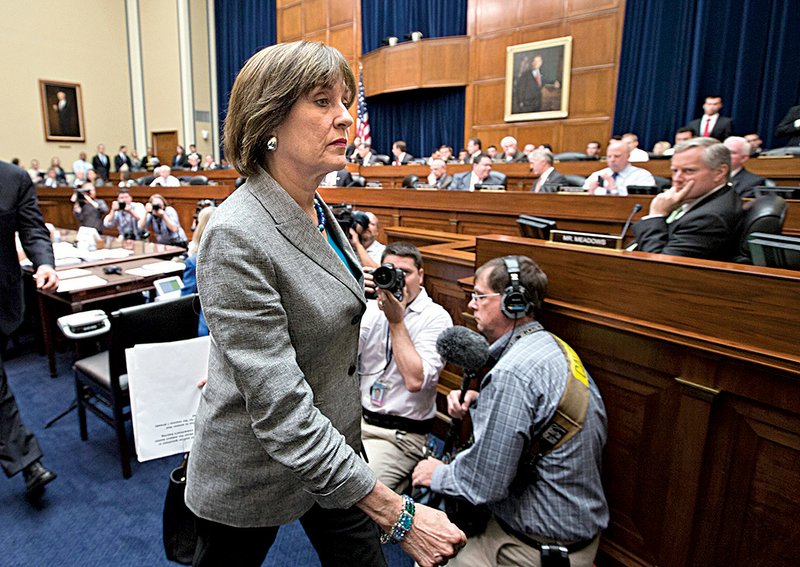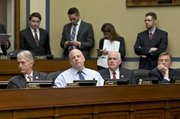WASHINGTON - The Internal Revenue Service official who first disclosed that the agency had targeted conservative groups denied Wednesday that she had ever provided false information to Congress. She then invoked her Fifth Amendment right not to testify.
As Lois Lerner appeared under subpoena before the House Committee on Oversight and Government Reform, she sternly told her questioners that allegations that she had misled Congress in previous testimony were false.
“I have not done anything wrong. I have not broken any laws,” said Lerner, 62, who joined the IRS in 2001 and leads the IRS’ division on tax-exempt organizations. “I have not violated any IRS rules and regulations, and I have not provided false information to this or any other congressional committee.”
She refused to say anything further despite attempts by Rep. Darrell Issa of California, the commit-tee’s chairman, to persuade her otherwise. Issa, a Republican, then dismissed her and her attorney from the hearing. That triggered objections by some Republicans, who said Lerner should not be let go so quickly.
RELATED ARTICLE
http://www.arkansas…">IRS’ Lerner not first to take Fifth
“You don’t get to tell your side of the story and then not be subjected to cross-examination,” Rep. Trey Gowdy of South Carolina said. “She ought to stand here and answer our questions.”
Issa made a second attempt to persuade her to change her mind. But when she declined, he dismissed her again. Lerner then exited the hearing room with her attorney.
Issa said Lerner might have waived her constitutional right against self-incrimination by making a substantive opening statement. He said he would consult with others - including her lawyer and House attorneys - before determining whether to summon her again, hopefully deciding by the time Congress returns from a recess early next month.
“She’s a fact witness with a tremendous amount that she could tell us,” Issa said.
Members of Congress have angrily complained that Lerner and other high-ranking IRS officials did not inform them that conservative groups were singled out, even though lawmakers repeatedly asked the IRS about it after hearing complaints from Tea Party groups.
By one lawmaker’s count, Lerner was asked 14 times by members of Congress or their staff members without revealing that the groups had been targeted.
On May 10, when Lerner first apologized for the targeting, she said she had learned about the targeting from news reports in early 2012. But a Treasury inspector general’s audit indicated that she knew far earlier than that.
The report said IRS agents in a Cincinnati office started targeting Tea Party and other conservative groups for additional scrutiny in March or April of 2010.
Lerner learned in June 2011 that agents in her division were singling out groups with “Tea Party” and “Patriots” in their applications for tax-exempt status, the report said. She ordered agents to scrap the criteria immediately, but later the practice evolved to include groups that promoted the Constitution and the Bill of Rights.
Also appearing before the committee on Wednesday were Neal Wolin, the deputy secretary of the Treasury Department; J. Russell George, the Treasury inspector general for tax administration; and Douglas Shulman, a former commissioner of the IRS.
Lerner’s supervisors said they, too, were kept in the dark for nearly a year. One of those supervisors was Deputy IRS Commissioner Steven Miller, who later became acting head of the agency. He was forced last week to resign.
Miller said he first learned in May 2012 that conservative groups had been singled out. He promptly told his boss, IRS Commissioner Shulman.
But for the second straight day, Shulman testified that he didn’t tell anyone in the Treasury Department or the White House because he was awaiting the results of an audit by the agency’s inspector general. The IRS is part of the Treasury Department.
Shulman stood by that Wednesday and was pressed once again by lawmakers about why he didn’t say anything.
“At the time I learned about this list, I felt I was taking the appropriate actions and that my course was the proper one, and I still feel that way today,” Shulman said.
Shulman, who was appointed by President George W. Bush, left in November when his five-year term expired. Miller became acting commissioner when Shulman left.
George, the Treasury inspector general, has blamed ineffective management for allowing agents to improperly target conservative groups for more than 18 months.
On Wednesday, he hinted that there may be more revelations to come. He told the oversight committee that his office has since uncovered other questionable criteria used by agents to screen applications for tax-exempt status.But he refused to elaborate.
U.S. Treasury Secretary Jacob Lew said Wednesday during a separate hearing that he’ll wait for more information to decide whether Lerner acted improperly.
At a House Financial Services Committee hearing, Lew declined to answer a question from Rep. Scott Garrett, R-N.J., about whether he agreed with Lerner’s assertion that she has“not done anything wrong.” Garrett told Lew it was a “yes or no” question.
“Congressman, it’s not a yes or no,” Lew said. “I’m going to wait to have all the facts.”
Members of both parties used Wednesday’s hearings to offer unsparing criticism of the IRS and the agency officials who sat before them, saying revelations that the agency had singled out certain politically minded groups were inexcusable.
“The power to tax is the power to destroy,” Issa said.
Rep. Elijah Cummings of Maryland, the senior Democrat on the committee, also scolded the agency.
“I believe there was gross incompetence and mismanagement,” he said. “We are better than that. We are simply better than that.”
But Cummings also admonished his Republican colleagues.
“I think we need to be very, very careful not to let partisanship undermine the integrity not only of the committee but our investigation and our work product,” he said.
One Democrat, Rep. Stephen Lynch of Massachusetts, even raised the threat of appointing a special prosecutor if Congress continues to feel that the IRS is not being straightforward.
“We know where that will lead. It will lead to a special prosecutor,” he said. “There will be hell to pay if that’s the route we choose to go down.”
Rep. Jim Jordan, R-Ohio, linked the IRS scandal with other issues that are dogging the Obama administration.
“This administration, which told us and told the American people that the attack that killed four Americans in Benghazi … was caused by a video, is now the same administration who expects us to believe that this scandal was just the result of two rogue agents in Cincinnati,” he said, referring to the attack last year at a consulate in Libya. “The people don’t buy it.”
No evidence has emerged that anyone outside the IRS, including the White House, directed agents to go after conservative groups. And there has been no evidence that anyone outside the IRS was made aware that the groups were being targeted until a few weeks before the inspector general released his report on the situation last week.
Still, Obama’s top spokesman said Wednesday that the White House is facing “legitimate criticisms” for its shifting accounts about who knew what, and when they knew it.
Press secretary Jay Carney first said only Obama’s top lawyer knew the IRS was being investigated in the weeks before the inspector general’s report was released. Later, he said the chief of staff and other top officials also knew.
“There have been some legitimate criticisms about how we’re handling this,” Carney said. “And I say ‘legitimate’ because I mean it.” Information for this article was contributed by Jeremy W. Peters of The New York Times; by Alan Fram, Stephen Ohlemacher and Julie Pace of The Associated Press; and by Richard Rubin, Ian Katz, James Rowley and Jennifer Oldham of Bloomberg News.
Front Section, Pages 1 on 05/23/2013


